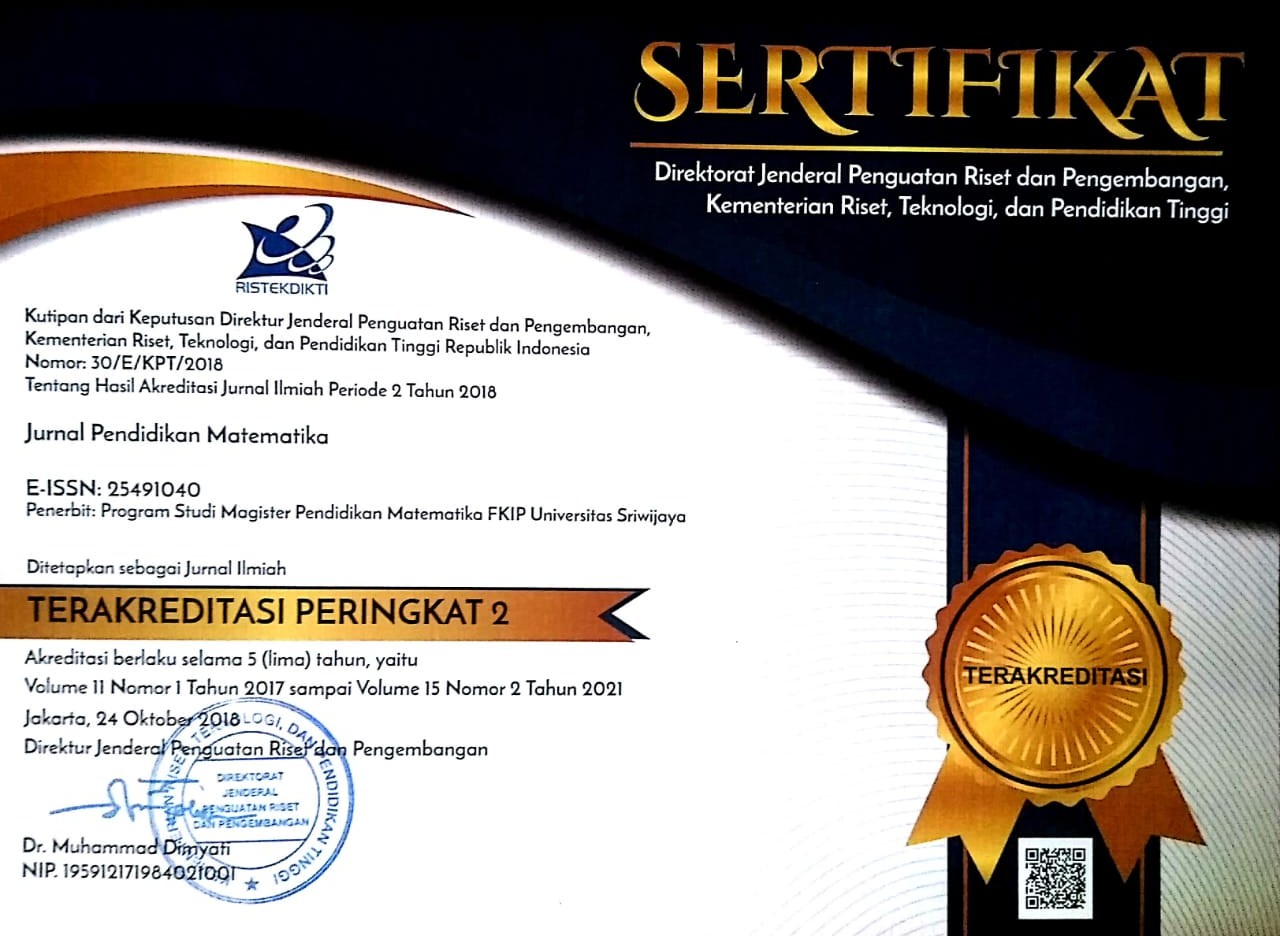PENGEMBANGAN LKPD PEMODELAN MATEMATIKA SISWA SMP MENGGUNAKAN KONTEKS OJEK ONLINE
Abstract
Keywords
Full Text:
PDFReferences
Arseven, A. (2015). Mathematical modelling approach in mathematics education. Universal Journal of Educational Research, 3(12), 973-980. https://doi.org/10.13189/ujer.2015.031204.
Astuti, P., Hartono, Y., Bunayati, H., & Indaryanti. (2017). Pengembangan LKS berbasis pendekatan pemodelan matematika untuk melatih kemampuan koneksi matematis siswa SMP kelas VIII. Jurnal Pendidikan Matematika, 11(2), 61-78. https://doi.org/10.22342/jpm.11.2.4613.61-78
Bliss, K., & Libertini, J. (2016). Guidelines for Assessment & Instruction in Mathematical Modeling Education: What is Mathematical Modeling?. USA: Comap, Inc & Siam.
Blum W. (2011). Can Modelling Be Taught and Learnt? Some Answers from Empirical Research. In Kaiser G., Blum W., Borromeo Ferri R., Stillman G. (Eds.) Trends in Teaching and Learning of Mathematical Modelling. International Perspectives on the Teaching and Learning of Mathematical Modelling, vol 1. Dordrecht: Springer. https://doi.org/10.1007/978-94-007-0910-2_3.
Blum W. (2015). Quality teaching of mathematical modelling: What do we know, what can we do?. In: Cho S. (eds). Proc. 12th International Congress on Mathematical Education. (pp. 73-96). Cham: Springer. https://doi.org/10.1007/978-3-319-12688-3_9.
Dewi, A.I.C., Zulkardi, & Yusuf, M. (2017). Kesulitan siswa dalam menyelesaikan soal-soal PISA tahun 2012 level 4, 5, dan 6 di SMP N 1 Indralaya. Jurnal Pendidikan Matematika, 11(2), 1-15. https://doi.org/10.22342/jpm.11.2.4643.1-15
Kadir, & Masi, L. (2014). Penggunaan konteks dan pengetahuan awal matematika dalam pembelajaran keterampilan berpikir kreatif siswa. Jurnal Pendidikan Matematika, 5(1), 52-66. http://doi.org/10.36709/jpm.v5i1.2041
Karoliandiki, L. (2017). Pengembangan LKS Berbasis Mathematical Modelling pada Materi Turunan di Sekolah Menengah Atas. Skripsi. Inderalaya: FKIP Unsri.
Kemendikbud. (2014). Lampiran Permendikbud No.104 tentang Penilaian Hasil Belajar oleh Pendidik pada Pendidikan Dasar dan Menengah. Jakarta: Kemendikbud.
Nadiah. (2015). Pengembangan LKS Berbasis Pendekatan Pemodelan Matematika pada Materi Sistem Persamaan Linear Di SMAN 18 Palembang. Skripsi. Inderalaya: FKIP Unsri.
OECD. (2016). PISA 2015: Result in focus. Paris: OECD Publishing.
Putri, R.I.I. (2015). Pengaruh interaksi pendekatan pembelajaran dan bentuk tes formatif terhadap hasil belajar matematika. Jurnal Pendidikan dan Pembelajaran, 22(1), 69-75.
Putri, R.I.I., Dolk, M., & Zulkardi. (2015). Professional development of PMRI teachers for introducing social norms. Journal on Mathematics Education, 6(1), 11-19. http://doi.org/10.22342/jme.61.11.
Tan, L. S. & Ang, K. C. (2016). A school-based professional development programme for teachers of mathematical modelling in Singapore. Journal of Mathematics Teacher Education, 19(5), 399-432. http://doi.org/10.1007/s10857-015-9305-z.
Tessmer, M. (1993). Planning and Conducting Formative Evaluations. London: Kogsn Page Limited.
Sari, D.P., Darmawijoyo, & Santoso, B. (2018). Pengaruh pendekatan pemodelan matematika terhadap kemampuan koneksi matematis siswa kelas VIII MTs Aisyiyah Palembang. Jurnal Pendidikan Matematika Kreatif-Inovatif, 9(1), 71-77. http://doi.org/10.15294/kreano.v9i1.12330.
Saxena, R., Shrivastava, K., & Bhardwaj, R. (2016). Teaching mathematical modeling in mathematics education. Journal of Education and Practice, 7(11), 34-44.
Selvia, F.R., Darmawijoyo, & Yusuf, M. (2014). Penerapan pembelajaran pemodelan matematika menggunakan pendekatan konstruktivisme terhadap kemampuan pemecahan masalah untuk siswa kelas VIII SMP. Aksioma, 3(1). 66-74.
Wake, G., Foster, C., & Swan M. (2015). Understanding issues in teaching mathematical modelling: Lessons from lesson study. Proc. CERME 9 - Ninth Congress of the European Society for Research in Mathematics Education. (pp. 937-943). Prague: Charles University.
Wati, E.H., & Murtiyasa, B. (2016). Kesalahan siswa SMP dalam menyelesaikan soal matematika berbasis PISA pada konten change and relationship. Makalah disajikan pada Konferensi Nasional Penelitian Matematika dan Pembelajarannya (KNPMP I) UMS 2016.
Widiati, I. (2015). Mengembangkan kemampuan representasi matematis siswa sekolah menengah pertama melalui pembelajaran kontekstual. Jurnal Pengajaran MIPA, 20(2), 106-111. http://doi.org/10.18269/jpmipa.v20i2.571
Wijaya, A., et.al. (2014). Difficulties in solving context-based PISA mathematics task: An analysis of student’s errors. The Mathematics Enthusiast, 11(3), 555-584.
Wulandari, W., Darmawijoyo, & Hartono, Y. (2016). Pengaruh pendekatan pemodelan matematika terhadap kemampuan argumentasi siswa kelas VIII SMP Negeri 15 Palembang. Jurnal Pendidikan Matematika, 10(1), 111-123. https://doi.org/10.22342/jpm.10.1.3292.111-123.
Zulkardi. (2006). Formative Evaluation: What, Why, When, and How. (Online), (http://www.geocities.com/ zulkardi/books.html), diakses pada 10 April 2018.
Zulkardi. (2013). Designing joyful and meaningful new school mathematics using Indonesian realistic mathematics education. Southeast Asian Mathematics Education Journal, 3(1), 17-25.
Zulkardi & Kohar, A.W. (2018). Designing PISA-like mathematics tasks in Indonesia: Experiences and challenges. Journal of Physics: Conference Series, 947(1). https://doi.org/10.1088/1742-6596/947/1/012015
Zulkardi & Putri, R.I.I. (2010). Pengembangan blog support untuk membantu siswa dan guru matematika Indonesia belajar pendidikan matematika realistik Indonesia (PMRI). Jurnal Inovasi dan Perekayasa Pendidikan, 2(1), 1-24.
DOI: https://doi.org/10.22342/jpm.14.1.6825.1-14
Jl. Srijaya Negara, Bukit Besar
Palembang - 30139 Indonesia
Jurnal Pendidikan Matematika is licensed under a Creative Commons Attribution-NonCommercial-ShareAlike 4.0 International License.
Indexed in:


